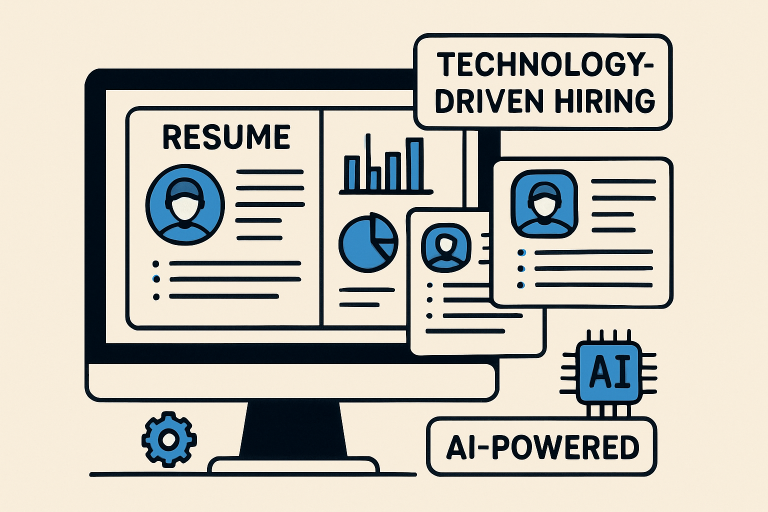
Table of Contents
- Digital Shifts in Modern Hiring
- The Role of Artificial Intelligence in Recruitment
- Data-Driven Hiring Decisions
- Evolution of the Candidate Experience
- Remote Work and Accessing Global Talent
- Shifting Focus: Skills Over Degrees
- Promoting Diversity, Equity, and Inclusion Initiatives
- Embracing the Future of Digital Recruitment
Digital Shifts in Modern Hiring
The landscape of talent acquisition is experiencing rapid transformation as technology reshapes how organizations approach hiring. Traditional recruitment methods—such as paper resumes, face-to-face interviews, and manual job postings—are quickly being outpaced by digital-first strategies that prioritize efficiency, accessibility, and data-driven outcomes. This fundamental digital shift has been particularly accelerated by global events, such as the COVID-19 pandemic, compelling companies to adapt and innovate at an unprecedented rate.
Modern employers are increasingly relying on advanced digital platforms to source, assess, and onboard talent, with leading solutions found on every reputable recruiting website. These platforms centralize hiring processes, offer automation tools, and integrate analytics that empower HR professionals to make more informed decisions, enhance communication, and tap into broader talent pools.
The Role of Artificial Intelligence in Recruitment
Artificial Intelligence (AI) is revolutionizing recruitment by automating routine tasks and providing deep insights into candidate fit. AI-powered tools now handle everything from resume screening to interview scheduling, freeing up valuable time for HR teams and ensuring a more objective review of applicants. These algorithms can rapidly analyze thousands of resumes, flagging top candidates based on skill match, experience, and even culture fit. According to experts, including research highlighted by SHRM, AI is increasingly shaping both recruitment and retention strategies, helping organizations make smarter, data-driven decisions while reducing bias.
Machine learning and natural language processing are further enhancing the process by enabling predictive analytics, which helps organizations identify candidates with high potential and lower the risk of early turnover. This not only accelerates the time-to-hire process but also creates a fairer and more unbiased recruitment workflow.

Data-Driven Hiring Decisions
The influx of recruitment technology has led to a wealth of analytics that fundamentally change how hiring decisions are made. Access to real-time data enables recruiters to evaluate the effectiveness of their strategies, forecast future workforce needs, and refine the candidate pipeline.
Organizations that employ a data-driven approach to recruitment enjoy increased efficiency, reduced hiring costs, and better workforce planning. Metrics on time-to-fill, candidate sources, and applicant drop-off rates guide strategic adjustments, ensuring continual improvement.
Evolution of the Candidate Experience
Candidate expectations have shifted swiftly in the digital age. Modern applicants anticipate a hiring process that is transparent, efficient, and interactive. This has led companies to embrace technology-driven methods such as asynchronous video interviews, online skills assessments, and real-time chatbots.
Ensuring a positive candidate journey is essential—not just for hiring success, but also for employer branding. Dynamic communication, constructive feedback, and user-friendly interfaces are key differentiators for organizations.
Remote Work and Accessing Global Talent
The expansion of remote and hybrid work has rewritten the rules of talent acquisition. Teams are no longer limited by geography, allowing companies to access a broader range of skills and backgrounds. This global reach enables the creation of richer, more diverse workforces and promotes greater inclusivity.
With the proper digital infrastructure and collaborative tools, organizations can seamlessly manage hiring, onboarding, and collaboration across borders. This expanded access to global talent creates new opportunities for innovation and growth, particularly for companies that are willing to adopt flexible work arrangements.
Shifting Focus: Skills Over Degrees
A profound shift is occurring in how organizations evaluate potential hires. Increasingly, hiring managers are prioritizing demonstrable skills—both technical and soft—over traditional academic credentials. This change is largely driven by the dynamic needs of modern workplaces, where success often depends on adaptability, problem-solving, and up-to-date expertise.
New tools allow employers to assess skills through simulations, gamified challenges, or stackable micro-credentials. This not only opens opportunities for candidates from diverse educational backgrounds but also ensures a more equitable evaluation process.
Promoting Diversity, Equity, and Inclusion Initiatives
Technology is also a powerful ally in advancing diversity, equity, and inclusion (DEI) within organizations. Automated screening and structured interviews can help mitigate unconscious biases that might arise in manual processes. Sophisticated platforms support ‘blind’ hiring practices, anonymizing candidate data to further level the playing field.
By using digital tools, companies attract a broader range of candidates and foster a fair environment where merit is prioritized.
Embracing the Future of Digital Recruitment
The world of hiring is evolving at an unprecedented pace, driven by technology, data, and changing workforce expectations. Digital tools, AI, and analytics are no longer optional—they are essential for organizations seeking efficiency, fairness, and access to global talent. From enhancing candidate experiences to prioritizing skills over traditional credentials, modern recruitment empowers companies to be more agile, inclusive, and strategic. By embracing these digital shifts, organizations can build stronger teams, foster diversity, and stay competitive in an increasingly dynamic talent landscape.
